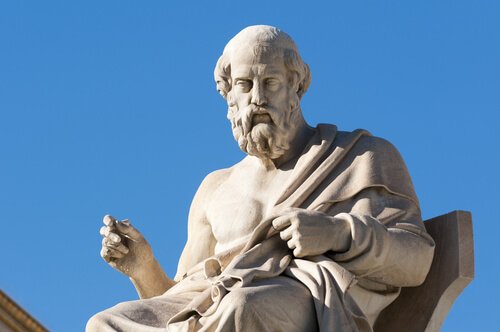What is Platonic Love?

Love has always been one of the most talked about subjects. It has been a source of inspiration for poets, writers, thinkers, and philosophers since the beginning of time, and still is. Of course, the ancient Greek philosopher, Plato, is no exception to that rule.
Some info about Plato
Plato was a Greek philosopher. First he was Socrates’ student and later on Aristotle’s teacher. He wrote many things, but the most well-known are probably his Symposium and his Allegory of the Cave. The Symposium is where he talked about his idea of love, so it’s where we get our idea of what “platonic love” is.

Plato saw love as a motivation for us to discover and experience beauty for its own sake. But you had to understand the beauty through dualism, which is one of the main ideas in his philosophy. Dualism is the philosophical concept that says that the way we see our reality comes from two independent substances that can never mix: the material (physical) and immaterial (spiritual).
They might be able to come together, but they can never truly mix. Plato thought that human beings were made up of body and soul, and that the soul had to do with the realm of ideas, while the body belonged to the material world. The soul also has to coexist with the body it’s trapped in, but both of these two realities are completely independent.
This is the philosophical concept Plato based his idea of love on. But a lot of people misunderstood it. It got to the point that they saw platonic love as an abstinent, spiritual kind of love. It’s just not the case, though. This philosopher’s idea of love occupied a middle ground: it wasn’t exactly about being promiscuous, or abstinent, because he saw perfection in stability.
Love
There are so many different meanings, feelings, and uses for this concept. So it’s really not at all easy to try to define it in a simple way. But one absolutely certain aspect of love is that it’s a universal concept that has to do with our connection to each other.
In English, the word love involves a ton of different feelings. It can be anything from passionate desire and the intimacy of romantic love, all the way to the non-sexual emotional intimacy you have with your family. It can even involve deep devotion: religious love.
Whatever kind of love we’re talking about, the emotions are always extremely strong. We could even say they’re irresistible, because it’s basically impossible to run away from them. Platonic love is actually a really important part of our relationships with each other, too, which is why it’s such a source of inspiration in the arts, and why psychology studies it so much.
“There is always some madness in love. But there is also always some reason in madness.”
-Friedrich Nietzsche-
What’s the idea behind platonic love?
When we put the word “platonic” onto love, it means we’re talking Plato and his philosophy. Through a speech by Socrates, Plato says that love is the motivation or the impulse that makes us want to understand beauty and experience it. It’s about loving forms or eternal, understandable, perfect ideas that go beyond physical beauty (which doesn’t mean he excludes it).
In other words, Plato thought that love came from our desire to discover and experience beauty. The process starts when you appreciate physical beauty and then move onto the spiritual kind. So the highest level of this is a pure, passionate, and selfless experience of beauty’s essence.
As you can see, platonic love isn’t exactly about non-romantic love. It’s more of a kind of love that goes beyond physical beauty, as hard as that might be. It doesn’t really have sexual elements, either, because Plato didn’t think love was really about another person. He saw it as something we’re supposed to direct towards the transcendent essence of beauty.
This is what Plato says about it in the Symposium:
“[…] he will consider that the beauty of the mind is more honourable than the beauty of the outward form. So that if a virtuous soul have but a little comeliness, he will be content to love and tend him, and will search out and bring to the birth thoughts which may improve the young, until he is compelled to contemplate and see the beauty of institutions and laws, and to understand that the beauty of them all is of one family, and that personal beauty is a trifle.”

Beauty and love according to Plato
According to Plato, we start to experience love when we come across beauty. Of course, keep in mind that his definition of love is what pushes us to discover and experience beauty. There are actually multiple stages, too, where you experience different kinds of beauty:
- Physical beauty: this is the first stage. It starts with a feeling of love towards a physical body, then evolves into appreciating their beauty in general.
- The beauty of souls: after crossing the barrier between appreciating and falling and love with a person’s physical body, you start to focus on who they are inside. So this stage has to do with their moral and cultural background. This is the stage where you go beyond the material (their body) and move onto the immaterial (their soul).
- The beauty of wisdom: the path from appreciating spiritual beauty always leads to a love of knowledge and ideas. It goes beyond the person you love.
- Beauty in and of itself: when you’ve gotten past the first three stages, one last door opens. It’s the chance to experience a love for beauty in and of itself, one that’s not tied to any subject or object. That’s why it’s the highest, most supreme level of love.
The last step involves passionately, purely, and selflessly experiencing beauty. It has to do with a feeling that will never go away, or change over time. So it’s really not about non-romantic love, it’s about appreciating ideas and perfect, eternal, understandable forms.
Why do we think of platonic love as a non-romantic love?
The first person to use the expression “platonic love” was Marsilio Ficino, in the 15th century. When he used it he meant it as a love focused on someone’s intelligence and the beauty of their character, not their physical appearance. It’s a love that only exists in the world of ideas, a perfect, incorruptible kind of love.
According to Plato, we can never actually achieve a pure version of this feeling. He said it was because love isn’t about interests, it’s about virtue. In other words, that’s what would be a perfect love, but perfection is just an illusion. There is nothing perfect in the real world because perfection can only exist in the realm of ideas.
We’re going to put it in simpler terms. Basically platonic love is an ideal kind of love where there’s no sexual desire. That’s why when we use the term in daily life, we talk about it as a non-romantic love you have for a friend, which obviously means it’s non-sexual, too.
So the expression does line up with what Plato says about love. But it only touches on a little bit of what true platonic love really involves. It’s not 100% off the mark, but the way we use the expression nowadays is still a bit wrong.

What does platonic love involve?
According to Plato, Beauty is the same as Justice, Goodness, and Truth. So love is always, necessarily about Beauty, Justice, Goodness, and Truth. Platonic love basically has to do with finding the part of your soul that you’re missing, in another person. But that person is mostly a representation of what you see as everything good, beautiful, truthful, and just.
So platonic love isn’t exactly the kind of non-romantic, friendly love we see it as. It’s kind of a middle ground that can obviously have sexual aspects, but that’s not the main focus. It can go beyond just a person’s body. It’s about being able to fall in love with ideas, with this other person’s soul. But that doesn’t mean we have to exclude bodily, sexual things. Those things can be part of it too, but love goes way beyond them.
This text is provided for informational purposes only and does not replace consultation with a professional. If in doubt, consult your specialist.








